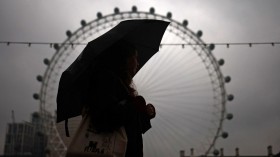A nostalgic feeling is an effective way of keeping oneself warm during cold nights, reveals a new study.
Researchers from University of Southampton, U.K., studied the effects of nostalgic feelings on the reaction to cold and warm temperatures.
Volunteers from universities of China and Netherlands took part in the study. The research team carried out various experiments to study the link between nostalgic feelings and physical warmth.
In the first study, participants were asked to keep a track of the number of times they felt nostalgic over a period of 30 days.
A majority of the volunteers felt nostalgic during cold days. For the second study, participants were put in different rooms where the temperature differed from each other.
One of the rooms was cold, with a temperature of 68 degree Fahrenheit (20 degree Celsius), the second room was comfortable, with a temperature of 75.2˚F (24˚C) and the third was a hot room with a temperature of 82.4˚F (28˚C).
When experts measured how nostalgic the volunteers felt, they found that participants in the cold room felt more nostalgic than participants in other rooms. There was no difference in the nostalgic feelings felt by the participants in the hot and comfortable rooms.
The third study involved music, where the study authors played music to evoke nostalgic feelings. Participants who said that music made them feel nostalgic also said the feeling made them physically warm.
In the fourth study, participants were asked to think of heart-warming memories in a cold room and guess the temperature of the room. Those who were able to recall nostalgic feelings guessed the temperature to be warmer than the actual temperature.
The participants were again asked to think of good memories for the fifth study and were insisted to keep their hands in ice-cold water. Those who felt nostalgic were able to retain their hands in the cold water for longer periods of time than others.
"Our study has shown that nostalgia serves a homeostatic function, allowing the mental simulation of previously enjoyed states, including states of bodily comfort; in this case making us feel warmer or increasing our tolerance of cold. More research is now needed to see if nostalgia can combat other forms of physical discomfort, besides low temperature," Dr. Tim Wildschut, co-author of the study from University of Southampton, said in a statement.
The findings of the study are published in the journal Emotion.
© 2024 NatureWorldNews.com All rights reserved. Do not reproduce without permission.




![Great White Sharks Observed for the First Time Changing Their Behavior in Different Marine Environments [Study]](https://1471793142.rsc.cdn77.org/data/thumbs/full/70251/280/157/50/40/great-white-sharks-observed-for-the-first-time-changing-their-behavior-in-different-marine-environments-study.jpg)
